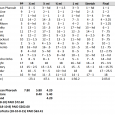 Lately, I’ve been getting a lot of e-mails about handicapping, the art/science of picking winners at the racetrack.
Lately, I’ve been getting a lot of e-mails about handicapping, the art/science of picking winners at the racetrack.
Most of these missives start the same way: “I’m a good handicapper, but…” The following question or comment then raises doubts about the opening statement.
The truth is most people aren’t good handicappers — they’re just too embarrassed or too proud to admit it, something I completely understand. After all, handicapping is one of the few endeavors in life (outside of sports, perhaps) that one could devote countless hours to studying and practicing, yet still stink in the end.
So, to help folks cut through the veil of pride and prejudice, I present the following 10 signs that your handicapping MAY need work:
- You rarely, if ever, construct your primary wagers around horses that wind up paying $20 or more (if they don’t win, they don’t count).
- You gain a sense of security from the odds: the lower the price, the better you feel about your chances of winning.
- When you watch televised races, like the Kentucky Derby or the Breeders’ Cup events, you are swayed by news stories or the opinions of others, specifically jockeys and trainers.
- You attach immense weight to races of historical significance, like the Santa Anita Handicap, Belmont Stakes, etc.
- Your sole focus is picking winners; after all, you reason, one cannot control the tote board.
- You are constantly on the lookout for the “key” to handicapping success and are especially fond of point-based handicapping systems or other simple angles (blinkers off, first-time Lasix, etc.).
- You believe that the best way to pick a winner is to know someone on the “inside.” Analyzing the past performances just muddies the water.
- For the most part, you think horse racing is “crooked” or “fixed.”
- You firmly believe that money management is a huge part of winning at the track — and you think yours stinks.
- You habitually blame others for your pari-mutuel failures: the jockey that “moved to soon,” the jockey that “moved too late,” the trainer, or that lousy handicapper on TV.
Now, I want to stress that these 10 points are simply warning signs. The bottom line in betting is far more straightforward: did you win or lose money? Period. My aim here is simply to get those folks that may be struggling focused on the things that actually matter. Hopefully, this will help.



